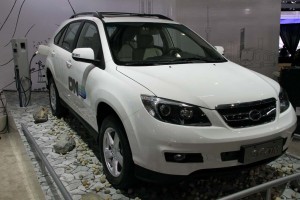
China is looking to increase is EV sales to 30% of all new car sales by 2030 and is using new policies to get there.
China’s top economic planning agency said it plans to tighten regulations for construction of new factories for vehicles using internal combustion engines and gasoline for fuel.
The new rules apparently have two goals. First, they will reduce the potential for the kind of overcapacity that plagues automobile industries in North America, Europe and other parts of Asia such as Japan where sales of new vehicles appear to have peaked as the country’s population ages.
Additionally, China’s new policies indicates the government wants to cut down on small “zombie” type car and truck makers that have been supported by provincial governments across China and helps promote Chinese efforts to promote the wider use of electric vehicles.
Last week, China committed to a policy that would and to have EVs represent 30% of the vehicles sold in China by 2030. At current rates, China’s carmakers and their international partners would have to build between 10 million and 12 million EVs annually. In addition, experts have said for some time that China’s sprawling auto industry is ripe for a sweeping, market-led restructuring but local authorities at the municipal and provincial level have continued to prop up money-losing car makers.
(China leads the way to global initiative pushing EV sales to 30% of all car sales by 2030. Click Here for the story.)
Meanwhile, China’s central government sees electric vehicles as a way for its industry to move ahead of international competitors, while also reducing intense urban smog. International carmakers such Volkswagen, General Motors, Ford and BMW traditionally have been oriented towards building internal combustion engines.
The policy directive from the National Development and Reform Commission on its website, extends to the automotive sector Beijing’s fight against overcapacity and “zombie” firms that is already underway in the coal and steel sector.
The so-called zombie automakers also would need to spend at least 3% of operating income on research and development, and produce cars deemed to be internationally competitive, the agency said.
(Click Here for the details about Daimler and BAIC’s deal to produce EVs in China.)
The document stressed promoting the orderly development of new energy vehicles, a term used for battery-electric and plug-in hybrid vehicles, broadly repeating existing rules for new factories in the segment.
China’s policies on so-called new energy vehicles have been somewhat contradictory. Experts on the Chinese auto industry noted during a recent conference at the University of Michigan have helped launching dozens of new firms dedicated to building experimental EVs.
The auto industry also has become a major source of employment in China and Chinese customers have shown a preference for SUVs.
(China approves VW deal with JAC to build EVs. Click Here for the story.)
The policy, however, is expected to encourage “zombie” automakers to exit the market, saying “in principal” it would not allow those that have partially halted production, rely on rolling over bank loans to survive or have been loss-making for consecutive years.
